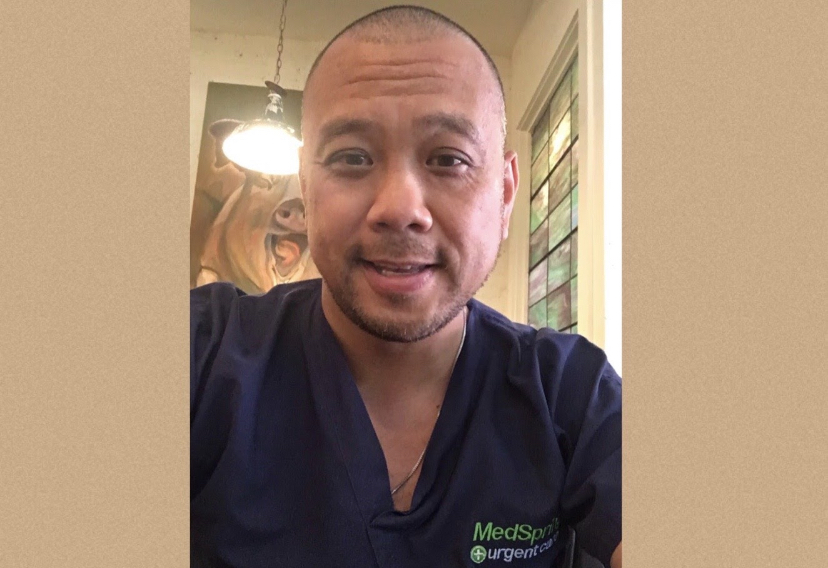Provided by Dr Mark Santa Ines
Dr. Mark Santa Ines
… to work on the front lines of the COVID-19 pandemic
I am the medical director at Schaumburg Immediate Care and the associate medical director at Med Spring Urgent Care, located in Chicago City. I work in an urgent care setting, so I deal with acute issues and injuries. I also see primary care patients, which are healthy patients that need refills on their medications.
Amidst the outbreak, my schedule has become more intense. Instead of working two to three 12-hour shifts per week, I work four to five shifts due to doctors refusing to work.
Additionally, while I see fewer patients now, the patients I see are more concerning. In my experience, 50% of COVID patients have mild cold-like symptoms. The patients I have to look out for are the patients accelerating remarkably fast in terms of respiratory compromise and are eventually at risk of respiratory failure or even death.
The scary part of the disease is that it is not just upper respiratory [symptoms] but also vague headaches and diarrhea. I even hear questions like, “I can’t see or I can’t smell.” The range of symptoms is just so broad it is difficult to pinpoint exactly what COVID is now. Out of 12 COVID patients I have sent to the ER, two have passed away. One was a severe asthmatic and the other was an obese, poorly controlled diabetic, so they fell into the demographic.
While COVID generally affects certain ages, my friend, [a doctor] in New York, has been incubating multiple 27-year-olds with no health issues. He describes COVID as a war-zone. He was actually in the war and worked with Ebola, yet he believes this is far worse. Since there is a shortage of ventilators, especially in New York, he must choose between who gets a ventilator and who does not, which is just a moral dilemma to have to choose who gets to live.
I would like to see stronger support from the federal government in terms of funding and equipment. They cannot put a price tag on lives. It is one of those situations where it is better to have more rather than less. We are still maxing out [on equipment] even with Chicago acting as our so-called Epi-Center. Even with China and Italy before us, we are just not prepared for [COVID].
There is a shortage of tests and the rapid tests are not that rapid. For example, rapid strep tests take about 10-15 minutes, but for the so-called rapid COVID test, doctors ship a whole batch out to the lab and receive them in one to two days [or even more].
Along with the shortages of tests, we have to wear our PPE (personal protective equipment) for the entire shift. On a regular basis, we would be able to change patient after patient, but now there is a huge shortage. We have to wear the same equipment all day, which can be exhausting.
In fact, I’m very extra proactive in terms of protecting my staff. We pre-screen before anyone enters our clinic and completely cover ourselves from head to toe, so there is no chance of corona getting to our clinic.
During this time, we just want to minimize [complications], so now we see most of the non-ill over the phone [through telemedicine]. Typically, patients can click online to a website and contract a vendor. Our staff assesses a patient and patches it through to me, so I can electronically prescribe medications. Of course, it is challenging because, with telemedicine, we cannot run tests and we have to go by [patient] history.
Nonetheless, I have received plenty of positive feedback from patients, so I want to continue [telemedicine] even when there is no fear of COVID. It has brought telemedicine to the forefront of medicine and it is there to stay.
With policies like telemedicine and social distancing, [we can] see a bending of that curve and fewer people complaining of symptoms. Compliance is the key factor in keeping this under control and preventing big outbreaks in the future. Just like with medications, if people don’t comply with them, then they might still have high blood pressure, heart attacks, or strokes. If people are not compliant with social distancing, using hand sanitizer, and covering their mouths, then it’s on them.
[This whole situation] is horrible. It is not just devastating to our country, but the entire world. The only good thing about a pandemic like this is that it unites mankind. [The focus is] all on COVID and people are working together, especially in the medical field trying to share information when they can in order to defeat the common enemy.
It sounds corny because I never picture myself saying something like this, but I see it as my duty. It is what I signed up for.

